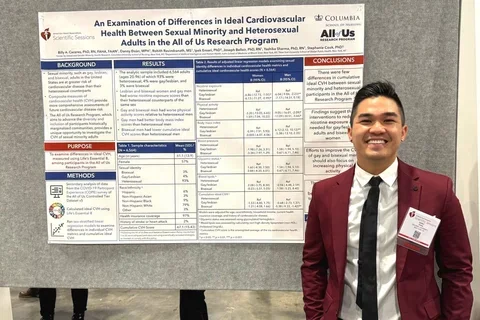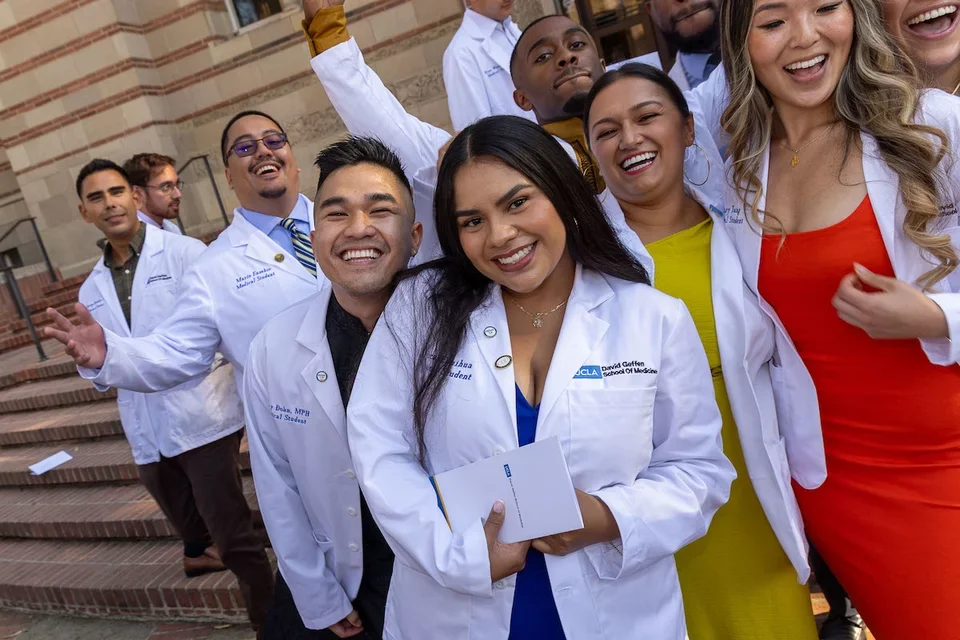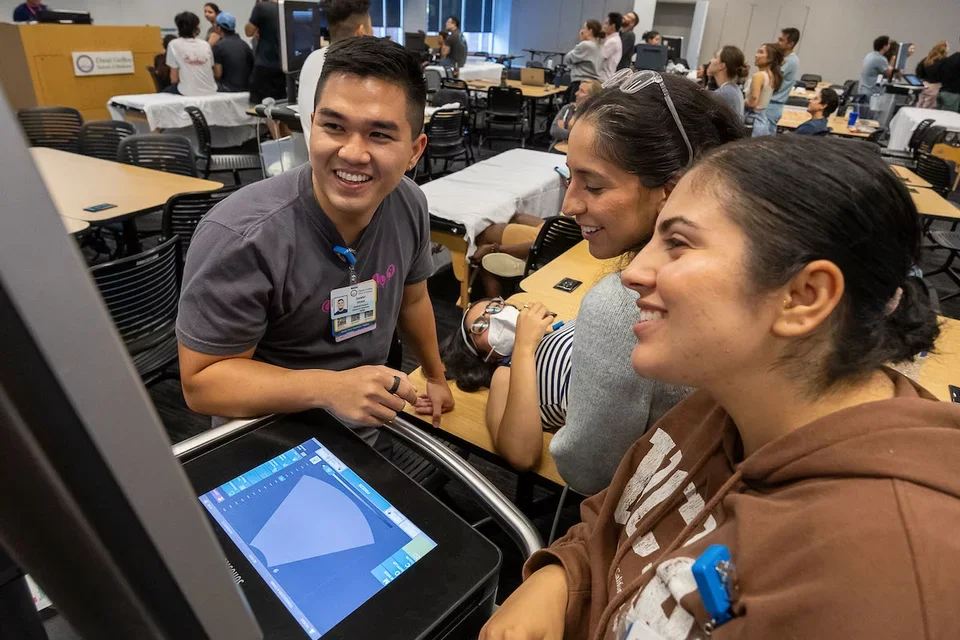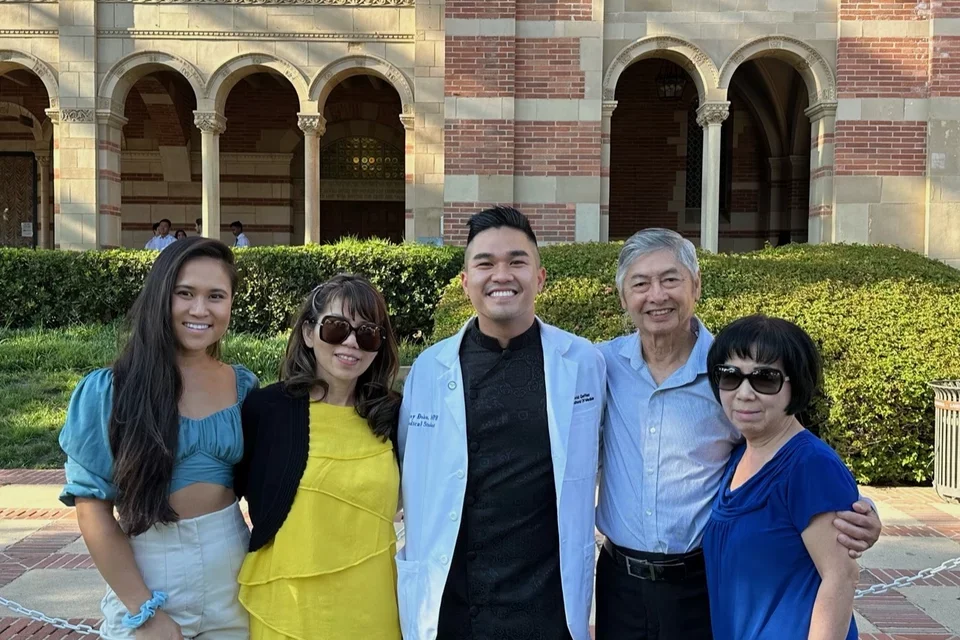Becoming the Physician His Underserved Hometown Needs—and Deserves
Student Spotlight

Meet Danny Đoàn
Medical student Danny Đoàn (he/him) calls Westminster, California home. It’s a historically underserved community of predominantly Vietnamese refugees—like Danny’s mother, grandmother, aunt, and uncle.
“Westminster is affectionately referred to as ‘Little Saigon’ due to the large diaspora of Vietnamese immigrants that inhabit the area,” Danny says.
This tight-knit community experiences disproportionately negative health outcomes relative to other areas. Diabetes, hypertension, and high cholesterol occur so commonly, residents call the devastating health trio by a nickname: ba cao.
“There are limited physicians in town and among those, only a handful can speak Vietnamese,” Danny adds. “This shortage of providers, confounded by poor diet, low health literacy, and barriers to insurance coverage creates insidious health disparities that have permeated across generations.”
Even as a kid, Danny noticed the lack of healthcare access and education among his family.
The disparities Danny witnessed growing up sparked his passion for pursuing a career in healthcare. In that aim, he saw an avenue for helping his family and community better enjoy the basic human rights to health and life.
Fun Fact: Despite growing up right by the California coast, Danny openly admits he can’t swim.

Finding his stride as a Bruin
Danny became a Bruin early in his higher education journey. In 2015, he started undergrad at the University of California, Los Angeles (UCLA) majoring in Human Biology & Society.
As a first-generation college student, Danny was elated to attend the number 1 public university in the United States. However, many of his childhood friends rarely had the opportunity to leave home and go to college. Overwhelmed by a lack of familiarity with the academic environment, he had a hard time believing he belonged.
“As a low-income, closeted gay kid growing up in Little Saigon, I never imagined I would be attending UCLA,” Danny explains. “and when I got there, I discovered that many of my peers had support systems and guidance from family members that I didn’t.”
Danny was able to gain his footing with the support of mentors, like Dr. Patrick Allard, and ultimately excelled. He graduated in 2019 with departmental highest honors and was awarded the Chancellor’s Service award by Chancellor Gene Block.
At this point in his journey, he knew he wanted a health-centric career but struggled to picture himself becoming a doctor.
“I wasn't sure I could go into medicine,” he explains. “Not because I didn't believe in myself, but because I didn’t see many physicians who came from my background.”
After enjoying a sunny So-Cal graduation, Danny headed East, to the Columbia University Mailman School of Public Health in New York, New York.
An unexpectedly illuminating public health education
While working toward his Master of Public Health (MPH) degree at Columbia, Danny learned even more about the extent and severity of health disparities and their resulting consequences.
He’d arrived in New York just prior to the COVID-19 pandemic. The crisis dissolved the metropolitan grad-school experience he’d been imagining, but it came with a silver lining, academically. The unprecedented public health event offered an unprecedented public health learning opportunity.
Danny observed how a real health emergency affected real people in real time. The negative health outcomes, as well as the ways they were disproportionately concentrated in underserved areas and populations, revealed unacceptable weaknesses and blind spots in public health infrastructure.
There’s a saying popular among Danny’s public health colleagues: When public health is at it’s best, you don't notice it.
The pandemic’s early challenges gave public health experts and citizens alike plenty to notice. In many cases, the pandemic spotlit broader areas of health and healthcare that hadn’t been working for decades before the coronavirus.
The pandemic ultimately spurred a majority of people to finally pay attention to issues that had long been negatively affecting a minority of people.
Even Danny, who’d witnessed disparities first-hand, found studying public health during the pandemic eye-opening.
“I really began to understand the kinds of barriers families and communities like mine face, whether it be limited access to healthcare or more systemic barriers, like insurance affordability.”
Before Danny received his MPH in 2021, he’d already committed to pursuing another advanced degree. His choice to study public health because he felt uncertain about medicine turned out to be more strategic than expected. It made him feel more committed than ever to the idea of becoming a doctor.
“After finishing my public health training, I decided to truly pursue medicine,” Danny explains. “Oftentimes in public health, we look at health in macro terms. As important and gratifying as this was, I really wanted to work hands-on with patients.”
Getting into medical school
Danny returned home to California and began preparing to apply to medical school. The process stretched for about two years but not because of any lack of motivation or conviction on Danny’s part.
He slowed down his med-school prep—studying for the Medical College Admission Test (MCAT®), for example—to make time for his family.
The health disparities and challenges long shadowing his Westminster, California community began showing up more noticeably in his own aging family members. Supporting them through their struggles elongated Danny’s path to med school, but seeing them struggle strengthened his drive to go.
“I firmly believe that diverse populations require diverse physicians,” he says. “But navigating healthcare for my Vietnamese immigrant family was really difficult. As somebody who speaks fluent Vietnamese, I know that as a physician I can provide great comfort to folks who look like me or who maybe share a similar background.”
Danny experienced this kind of comfort for the first time while participating in the Harbor-UCLA Summer Urban Health Fellowship (SUHF). Wearing the shoes of a future practitioner instead of a patient, he finally experienced what it would be like to work hands-on with patients.
For over six weeks, he shadowed Drs. Gilberto Granados and Jyoti Puvvula, UCLA Family Medicine physicians and directors of SUHF, who both serve the predominantly Hispanic and Latinx communities of Lomita and South Los Angeles. He witnessed how primary care physicians could practically dissolve a patient’s anxiety by greeting them in their own language or sharing an empathetic smile.
Danny’s time in SUHF provided the real-world evidence he needed to truly believe he could become a doctor. It also helped him picture exactly the kind of doctor he wanted to be, one who’s kind, compassionate, and deeply empathetic.
“Drs. Granados and Puvvula taught me the simple significance of truly caring for patients, and how compassion is paramount to providing quality care and building trust with patients and the community.”

Life as a UCLA med student
Danny’s path to medical school ended in well-deserved celebration. He found out he was admitted into his dream program: the PRIME-LA program at the David Geffen School of Medicine at UCLA (DGSOM) on his birthday.
“I never imagined I would be returning to UCLA for medical school, and I feel so fortunate to be part of the PRIME-LA program,” Danny says. “When I was applying to medical school, I found PRIME-LA’s mission to deeply resonate with me. It’s uniquely seated at the nexus of social justice, advocacy, and medicine—exactly where I want to be.”
Danny feels confident that completing the 5-year program will optimize his ability to make a lasting impact on his home community.

The day-to-day work required to achieve that long-term goal can be understandably challenging at times. Many mentors told Danny prior to med school that he’d be absorbing so much information he’d feel like he was drinking from a firehose.
Danny now understands exactly what they meant and even formulated his own modified metaphor.
“I think medical school is more like jumping into the ocean and trying to drink all the water while staying afloat,” he says. “There's so much to know and so much to learn. And I don’t even know how to swim!”
The advice he’d give his past self or anyone just starting med school is to accept and find comfort in not knowing everything.
“You’ll never be able to know everything you might want to know, and that’s okay. There’s a reason why it’s called ‘practicing’ medicine.”
Remembering that healthcare is a team sport helps Danny find peace in not knowing it all. Practitioners help each other out, filling in knowledge and skill gaps when needed.
“Coming from a public health background, you understand that the physician is only one part of a person’s health journey,” Danny says. “We must work alongside all members of the healthcare team in order to provide the best care for our patients.”
On top of his medical school commitments, Danny stays involved with public health research on cardiovascular health disparities in LGBTQ+ populations, which he became invested in while studying at Columbia.
For a few hours each month, he meets with his mentor, Dr. Billy Caceres, to engage in meaningful examinations of how stress, discrimination, and other modifiable risk factors disproportionately affect cardiovascular health among sexual minority adults.

A champion for Little Saigon
Danny hasn’t yet committed to a medical specialty, but the idea of practicing in a primary care field, such as family medicine or internal medicine, feels right to him.
When most people need medical care, they start by visiting a primary care doctor. That initial encounter can set the tone for the rest of their experience—for better or worse.
“I’ve had a lot of experience taking my family to primary care providers that weren't always as welcoming as I’d hoped they’d be,” Danny says. “That can turn folks off from pursuing even critical medical needs.”
In contrast, Danny hopes to provide patients with the kind of positive healthcare experience he’d always wanted. He aims to help them through their medical journeys, equipping them with the tools and resources they need to have agency over their health.
Thanks to his own personal experiences, Danny understands that cultivating, nurturing, and demonstrating empathy will empower him to help patients as much if not more than his medical skills and knowledge.
“All people deserve access to healthcare and health education, regardless of their circumstances.”
He knows that empathy combined with rigorous training will enable him and his colleagues to significantly expand healthcare access by not only observing the social and systemic determinants of health but also knowing exactly how to approach their dismantling.
“I’m looking forward to ending the cycle of ill-health and becoming a champion for Little Saigon,” Danny says. “I believe that I’m part of a new generation of scholars, a generation that questions the status quo and uplifts those who’ve been historically oppressed.”



